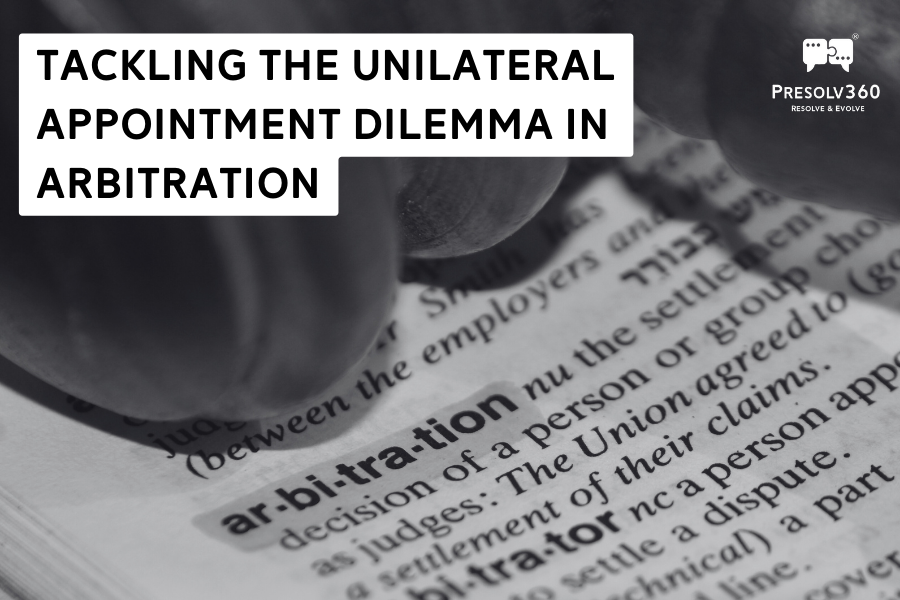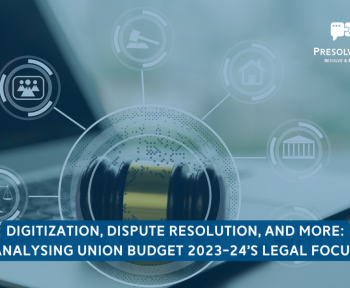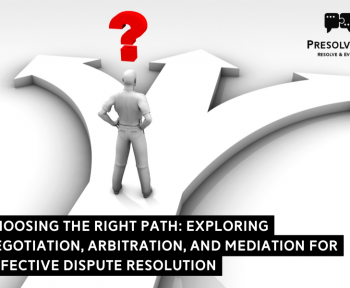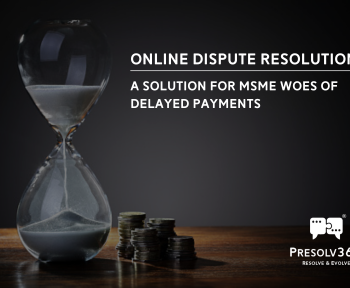The judiciary and the government encourage the use of technology and institutional structure to resolve disputes. Alternative dispute resolution (ADR) and online dispute resolution (ODR) institutions help provide dispute resolution services for arbitration, mediation, and conciliation. These institutions have the requisite administrative and technical expertise.

The issue around unilateral appointment
Section 12(5) read with the Seventh Schedule in the Arbitration and Conciliation Act, 1996 (“the Act”) is important to consider. According to it, any party to the agreement or person interested in the dispute’s outcome is ineligible as an arbitrator. Further, the unilateral appointment of an arbitrator by a party to the agreement also makes them ineligible. This also applies in the case of a person interested in the outcome of the dispute. Such a person should not chart any course to dispute resolution by having the power to appoint an arbitrator. Several judgments of the Supreme Court of India and various High Courts in the country have endorsed this viewpoint.
Accordingly, several Courts, under Section 34 of the Act, have set aside awards with instances of unilateral appointment of arbitrators. Additionally, many courts have recently dismissed a number of execution/enforcement petitions, under Section 36 of the Act, on this ground.
Following is the extract of one such case:
It is strange that the NBFCs like the award holder in the case in hand continue to do a shut-eye to the above legal provision and the binding dicta of the Supreme Court which as per Article 141 of the Constitution of India is Law of the Land and continue to appoint Soul Arbitrators [sic] unilaterally. The reluctance in having a neutral arbitrator for the purpose of adjudication of disputes is either rooted in a lack of confidence in the merits of the dispute or just an act of sheer arrogance, indifference, and non-abidance of the law. They seem to be toeing the same old line of taking a chance, with a mind that they would fall in line only when some objection is taken by the respondent at any point of time or some Court in some Order objects to the same. This conscious illegality which is continuing unabatedly in blatant violation of Statutory Laws and Laws laid by the Hon’ble Supreme Court needs to be stopped and curbed effectively.
The correct legal position on the above definition is that although the above definition was proposed by Arbitration and Conciliation (Amendment) Act, 2019 i.e. Act no. 33 of 2019 but the same is yet to be notified and is as such not binding law in [the] Arbitral arena. Moreover, the proposed amendment of the Act talks of constituting an ‘Arbitration Council of India’ which, in turn, will prepare a list of Arbitration Institutions on the basis of infrastructure, the calibre of arbitrators, performance, compliance of time limits etc. As per [the] proposed amendment, under Section 11(3A) of the Act, the designation of institutions by the Hon’ble Supreme Court and the High Courts is to be carried out only as per the proposal made by the ‘Arbitration Council of India’. This Court is apprised by Ld. Counsel for the plaintiff that the controlling Ministry of Arbitration and Conciliation Act, 1996 under Allocation of Business Rules, 1961 is the Ministry of Law and Justice, Govt. of India. It is submitted that the Law Ministry, Govt. of India has already prepared and notified a Pan India “List of Arbitral Institutions” offering quality Arbitration and Mediation services and the same is available in [the] public domain.
The above-detailed discussion fairly brings to the fore one fact that the ‘Unilateral Appointment of Arbitrators’ by the NBFCs is nothing but a blatant violation and disregard of Law laid by the Full Bench of Hon’ble Supreme Court and is akin to Contempt of Court. Filing a petition seeking execution of such Ex-Parte Awards obtained through such Unilateral Appointments is nothing but a classic example of abuse of the process of Courts by Award Holders to extract money out of the hapless respondents who more often than do not have any clue about the very initiation, holding of proceeding and passing of such like Ex-Parte Arbitral Awards before the chosen Sole Arbitrators in an assembly line like fashion.
Instead of aligning their Arbitration Agreements/Clauses and Arbitral Practices in consonance with Section 12(5) read with Schedule 7 of the Arbitration and Conciliation Act, 1996 post its amendment in 2015, they continued to harp over their age-old law practices of having in-house Unilaterally Appointed Arbitrators.
As guided by the afore-discussed binding judgments of the Hon’ble Supreme Court and Hon’ble Delhi High Court, the Ex-Parte Arbitral Award dated 30.12.2017, passed by Unilaterally Appointed Sole Arbitrator namely Sh. Durai Kaliyarethnam is declared ‘Non- Executable’. Considering this petition seeking execution of a clandestinely obtained Ex-Parte Arbitral Award as an ‘Abuse of Court Process’, the Execution Petitioner is burdened with the cost of Rs.25,000/-…
Arbitration in legacy agreements through Presolv360
Presolv360 is an independent and neutral ODR platform. It administers disputes by leveraging its institutional structure through mechanisms like mediation, conciliation, and arbitration on its virtual platform. Presolv360 merely provides technical and administrative support to the parties and the arbitrator for conducting the proceedings virtually. It has no interest in the outcome of the dispute or any conflict of interest. Presolv360 plays no role whatsoever in the determination of any dispute. It does not undertake any adjudicatory functions but only provides a virtual platform along with all support services.
The Department of Legal Affairs, Ministry of Law & Justice issued a notification (as referred by the District Judge). Addressing all ADR institutions, including Presolv360, it required a list of institutions offering ADR (and ODR) on the Department’s website. Presolv360 has additionally been empanelled as a Mediation Institute for court-annexed and pre-institution mediation. This is by the Main Mediation Committee, Hon’ble Bombay High Court and the Hon’ble Bombay City Civil and Sessions Court.
How does the arbitration process work at Presolv360?
Presolv360 empanels independent, qualified arbitrators with the required competence, knowledge, and varied expertise on its panel of arbitrators. The panel is diverse and consists of retired judges and other professionals like lawyers, engineers, accountants, etc. The Act governs the arbitration proceedings. An arbitrator from the said panel, on behalf of all the parties, presides over the arbitration proceedings. Any one party cannot hand-pick the panel. Due diligence ensures that there is no connection between any person on the panel and any of the parties to the matter. For this purpose, Presolv360 may use its automated case allocation tool that runs algorithms to randomize the assignment process.
The arbitrator must provide acceptance and consent to act as an arbitrator in the dispute, confirm that he/she is qualified, possesses the required competence, knowledge, and expertise to deal with the subject matter of the dispute and undertake to devote sufficient time to conduct the arbitration proceedings within the time limits prescribed. Further, the arbitrator makes requisite disclosures prescribed under Section 12 read with the Fifth Schedule to the Act. The arbitrator further confirms that his/her relationship with the parties or counsel or the subject matter of this dispute does not fall under any of the categories specified in the Seventh Schedule to the Act.
From the inception, the parties know of the administration of the proceedings through the virtual platform/institution. Thereafter, in the notification of registration of arbitration, details of the arbitrator along with the option to seek the list of arbitrators on the panel for the purpose of choosing another arbitrator to resolve the dispute is provided to the parties. Further, the parties are also provided with a simplified procedure to challenge the assignment of the matter to the arbitrator, as per law. Accordingly, all the parties to the dispute have an equal say in the appointment of the arbitrator and the constitution of the arbitral tribunal and also have the option to challenge the arbitrator on grounds concerning the arbitrator’s independence or impartiality or qualifications.
This is not a case of unilateral appointment of the arbitrator or appointment of the arbitrator by a person interested in the outcome or award passed by the arbitrator during the arbitration. The parties learn of the assignment of the arbitrator at the same time and have equal say and opportunity with aspects concerning the appointment of the arbitrator and the constitution of the arbitral tribunal, thus eliminating any influence of either party in the appointment of the arbitrator.
Endorsing this viewpoint, the Commercial Court, Bengaluru, while deciding an application under Section 14(2) read with section 14(1)(a) of the Act3, where Presolv360 administered the arbitration proceedings, held that:
“The applicant though has sought for termination of the arbitrator’s mandate on the ground of ineligibility, none of the circumstances as specified in the Seventh Schedule are shown to have been existing. Therefore, the sole arbitrator appointed through the ODR platform, per se, cannot be held to be ineligible under Section 12(5) of the Act.”
Arbitration in prospective agreements
For new agreements, we urge the incorporation of a dispute resolution clause enabling ODR through an independent institution. Model clauses can be viewed here.




